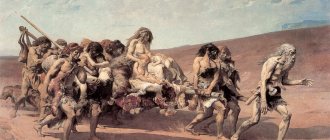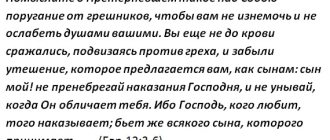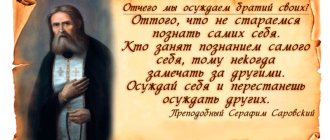The need for food for people
It is known that the Lord is an all-knowing teacher who can give an answer to any question. Modern research in nutrition and medicine confirms the fact that the information about foods that is mentioned in the Bible can be called correct and accurate.
God asked people to take care of their own bodies. Quality, nutritious food is part of this important process.
The Apostle Paul called on everyone to renounce everything that harms the body. This statement applies to alcoholic beverages, tobacco, and unhealthy foods.
Good nutrition is essential to staying healthy. If a person strives to glorify the Lord and wants to have enough energy for good deeds, he must adhere to the correct diet.
What not to eat on fasting days
According to church regulations, it is believed that entertainment and delicious food interfere with spiritual cleansing. To prepare for Easter, a Christian should give up having fun and eating fast food. Extensive list of prohibited products:
- meat, meat and sausage products;
- milk of animal origin, cheeses, other dairy products;
- eggs, products containing them;
- mayonnaise, ketchup, other industrial sauces and dressings;
- fish;
- alcoholic drinks;
- confectionery products made with dough with butter and eggs.
The main dishes during Lent are potatoes and cabbage. You can prepare a variety of dishes from them, from vegetable stew to cutlets and pies. The main thing is to make the right diet, because the use of vegetable oil is not allowed on all days.
Subject:
- Lent
Does the Christian religion condemn cravings for unhealthy foods?
The Bible is much more concerned with how much a person eats than with what exactly he eats.
If a person is unable to control his eating habits, he is likely to show intemperance in other areas of life, demonstrate laziness, judgment, and anger. No one should allow an increased appetite to override their will. Otherwise, food creates problems in a person's life. However, God will help you overcome difficulties. If a person turns to Him and seeks support, his prayers will be heard and his requests will be fulfilled. The Creator will give everyone the strength to overcome cravings for harmful foods.
What foods are not recommended by Orthodoxy?
What foods are not recommended by Orthodoxy?
Hello, our dear visitors!
Many foods are beneficial to humans and give health and strength to the body. And some products act quite the opposite - they harm a person and introduce him to one or another disease. It even happens that the same product can be useful for one and harmful for another. Now let's touch on the Orthodox side of this issue.
Archpriest Sergius Filimonov, candidate of theology and doctor of medical sciences, was asked an interesting question:
─ Some religions have a strict ban on eating certain foods. For example, Muslims do not eat pork. Are there similar prohibitions in Orthodoxy, or what foods are not recommended for an Orthodox person to consume?
“In Orthodoxy there is no prohibition of any type of food,” answers Father Sergius. ─ The book of the Acts of the Holy Apostles describes the vision of the Apostle Peter (Acts 10: 10-15) when he felt hungry and wanted to eat, went into a frenzy and saw many animals, “and a voice came to him: Arise, Peter, kill and eat. But Peter said: No, Lord, I have never eaten anything bad or unclean. Then another time a voice came to him: what God has cleansed, do not consider unclean.”
And although this vision was educationally concerned with the enlightenment of the pagans, it is the basis for many Christians to calmly eat any food if it is first sanctified by prayer and blessing.
In addition, the Lord said that “... nothing that enters a person from without can defile him; but what comes from it defiles a person. Because what comes out of a person does not enter into his heart, but into his belly, and goes out, it defiles a person, for from within, from the heart of man, come evil thoughts, adultery, fornication, murder, theft, covetousness, malice, deceit, lasciviousness, the envious eye, blasphemy, pride, madness. All this evil comes from within and defiles a person” (Mark 7: 15-23).
The repeal of laws prohibiting certain types of food, characteristic of the Old Testament religion of the Jews, contains deep theological meaning. The repeal of kosher laws symbolized the removal of the barrier between Jews and non-Jews. “In the new Christian era, God’s people must be set apart from the world (holy). However, this demarcation can no longer be carried out along national lines” (Evangelical Dictionary of Biblical Theology, M., 2002, p. 1149).”
Therefore, our dear visitors, we will have to choose for ourselves - what we can eat and what we should not eat.
Health was given to us by the Lord, and harming our body through overeating and gluttony is a sin!
One has only to look at people who eat well and see how they suffer from excess reserves in their body in the summer. Conversely, fit people who watch their diet can handle the heat with the ease of a child!
May God grant us all health!
<< To the main page Health Tips >>
Health is the main value
The Bible makes no mention of specific dietary recommendations. But it emphasizes the importance of observing measures to ensure that the body (a gift received by a person from the Lord) remains in normal physical condition. Poor health makes a person slow, lethargic, and increases the risk of injuries and various ailments. The reason for this situation is often poor nutrition and addiction to junk food. Constantly experiencing physical discomfort, a person cannot do what the Lord expects of him, to serve the Creator.
Rare shot: Viktoria Isakova showed her grown-up daughter from Yuri Moroz (new photo)
Smooth and fresh skin: dermaplaning, or why a woman needs to shave her face
Why French children behave well: eight ways to raise them
The Bible also teaches us to combine moderation with enjoying food as gifts from God during the holidays.
A person should follow a healthy diet. But sometimes allow yourself “holiday” food.
Buddhist food culture
Unlike the monotheistic religions of Christianity and Islam, Buddhism is a philosophical and religious doctrine in which there is no concept of sin, and therefore no prohibitions. However, the sacred texts of Buddhists contain a number of recommendations that should help adherents practice the Noble Eightfold Path and achieve Enlightenment. Some of these recommendations also concern nutritional culture.
The Eightfold Path is also called the Middle Path, that is, the path on which there are no extremes, therefore Buddhists are recommended to adhere to moderation in everything, including diet. And since Enlightenment is impossible without renouncing material and physical attachments, Buddhists must learn to perceive food only as a source of energy, but not as a source of pleasure.
Vegetarianism in Buddhism is encouraged, but is not mandatory - according to the teachers of this doctrine, each adherent must come to the refusal of meat from killed animals himself. However, Buddhists are discouraged from seeing animals killed or eating the meat of any animal that has been slaughtered specifically for them. For example, a Buddhist will never hunt and will not accept a bird or game killed during a hunt as a gift.
Faith and Dietary Restrictions
The law that the Lord gave to the inhabitants of Israel tells in detail what food they were allowed to eat and what was prohibited. However, modern Christians do not adhere to the rules that are listed in Leviticus 11. Although this does not mean that there are no dietary restrictions.
Even before the Law of Moses, the Christian religion had a ban on eating blood and the meat of strangled animals. Many believers still adhere to this restriction. What is it connected with?
The fact is that in the era of early Christianity, most of the meat products that were sold on the market were prepared for dedication to pagan deities. Moreover, buyers might not know about it. If a person refused meat prepared for sacrifice to a pagan god, he had to completely exclude this product from the diet.
The Lord gave Noah a law according to which it was forbidden to eat the flesh of strangled animals. Because blood is not drained from their bodies, but it contains the soul of any creature.
How to keep an Orthodox fast - Orthodox nutrition calendar for 2015, 2016
Orthodox nutrition calendar for 2015
- Great Lent (February 23 - April 11) During the 1st and Holy Week - strict fasting. On Clean Monday you can’t eat anything. For the rest of the time: dry eating according to Mon, Wed, Fri; on Tues and Thursdays - hot food without oil; according to BC - food with vegetable oil
- Good Friday (April 3) – you can’t eat until the shroud is taken out
- Lazarus Saturday (April 4) – fish eggs are allowed
- Palm Sunday (April 5) – fish allowed
- Annunciation of the Blessed Virgin Mary (April 7) – fish allowed
- Petrov fast (June 8 – July 11) . According to SR, PT – dry eating. According to Monday - hot food without oil. For the rest of the time - cereals with vegetable oil, as well as mushrooms and fish
- Assumption Fast (August 14 – August 27) . Dry eating - on Mon, Wed and Fri. On Thursday and Tuesday - hot food without oil. On Sat and Sun – food with vegetable oil
- Day of the Transfiguration of the Lord (August 19) - fish allowed
- Dormition – fish allowed (provided the holiday is on Wed or Fri)
- Nativity Fast (November 28 – January 6) . Meals are similar to the Petrov fast until St. Nicholas Day (December 19)
- Presentation of the Blessed Virgin Mary into the temple - fish allowed (if the holiday is on Wednesday or Friday)
- Between the Day of Remembrance of St. Nicholas and the Forefeast of Christmas, fish is allowed (according to Sat and Sun)
- Christmas Eve. You cannot eat until the 1st star. After her appearance - oozingly
- On Wed and Fri – weekly fast days (except for continuous weeks). According to the SR, meat and dairy products are prohibited, and during the week of All Saints until the Nativity of Christ, you cannot eat fish with vegetable oil. Vegetable oil is allowed only on the Days of the celebrated saints, which fell on Wed and Fri, and fish - on great holidays
- During 1-day fasts you can (except Wednesday and Friday) eat food with vegetable oil, fish is not allowed: January 18 (Epiphany Eve), September 11 (Beheading of John the Baptist) and September 27 (Exaltation of the Cross of the Lord). These days - strict fasting
- There is no fasting if Christmas and Epiphany fall on Wed or Fri
- Food with vegetable oil is allowed on holidays - the Exaltation of the Holy Cross, the Beheading of John the Baptist, as well as Christmas and Epiphany Eves
- Fish is allowed on Wednesday and Friday between Easter and Trinity , as well as on Wednesday and Friday on holidays - the Presentation, the Dormition, the Transfiguration of the Lord, Christmas, the Protection of the Blessed Virgin Mary, Her Presentation into the Temple, the Nativity of John the Baptist, the Apostles Peter and Paul, John the Theologian
Nutrition calendar for Orthodox Lent 2015
Orthodox nutrition calendar for 2016
- Great Lent (March 14 – April 30). For the 1st and Holy Weeks there is strict fasting. Complete abstinence - on Clean Monday. For the rest of the time: dry eating according to Mon, Wed and Fri; hot food without oil - on Tuesday and Thursday; food with vegetable oil - on Sat and Sun
- Annunciation of the Blessed Virgin Mary (April 7) – fish allowed
- Good Friday (April 22) – you can’t eat until the shroud is taken out
- Lazarus Saturday (April 23) – fish caviar is allowed
- Palm Sunday (April 24) – fish allowed
- Petrov fast (June 27 – July 11). According to SR and PT – dry eating. On Monday - hot food without oil, and for the rest of the time - cereals with vegetable oil, as well as mushrooms and fish.
- Dormition Fast (August 14 – August 27). Exclusively dry eating - according to Mon, Wed and Fri; hot food without oil - on Thursday and Tuesday. Food with vegetable oil – on Sat and Sun
- Assumption - fish is allowed if the day falls on Wed or Fri
- Day of the Transfiguration of the Lord (August 19) – fish allowed
- Nativity Fast (November 28 – January 6) . Nutrition plan until St. Nicholas Day (December 19) according to Petrov's fast
- Presentation of the Blessed Virgin Mary into the temple - fish is allowed if the day falls on Wed or Fri
- Between the Day of Remembrance of St. Nicholas and the Forefeast of Christmas , fish is allowed on Sat and Sun
- Forefeast . Food with butter is allowed on Saturday and Sunday. Fish is prohibited
- Christmas Eve . Before the 1st star you cannot eat. After her ascent - oozing
- On Wednesdays and Fridays there are fasts (with the exception of continuous weeks). Meat and dairy products are prohibited
- Sunday of All Saints until the Nativity of Christ. Vegetable oil and fish are prohibited. Oil can only be used on saints' days that fall on Wednesday and Friday
- Strict 1-day fasts (exception – Wed, Fri). Food with vegetable oil is allowed, fish is prohibited: September 27 (Exaltation of the Holy Cross), January 18 (Epiphany Eve), September 11 (Beheading of John the Baptist)
- Epiphany and Nativity of Christ – there is no fasting if holidays are on Wed and Fri
- Christmas and Epiphany Eves , Beheading of John the Baptist, Exaltation of the Holy Cross - food with vegetable oil is allowed
- Fish is allowed between Easter and Trinity (Wednesday and Fri), as well as on holidays that fall on Wed/Friday - Presentation, Transfiguration of the Lord, Dormition, Nativity, Protection of the Blessed Virgin Mary, Her Presentation into the Temple, Nativity of John the Baptist, the Apostles Peter and Paul , John the Evangelist
Conclusion
A proper diet ensures normal brain function, helps to effectively carry out mental activity, maintains hormonal balance, and a high quality of life. Good health provides a person with the opportunity to do good deeds and serve God.
The Christian religion emphasizes that it is important to maintain a friendly, careful and respectful attitude towards one’s own body. To do this, you need to eat properly and in moderation.
Found a violation? Report content











